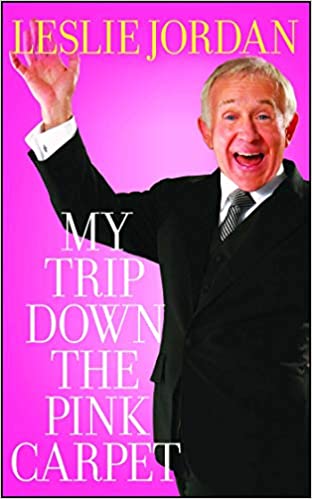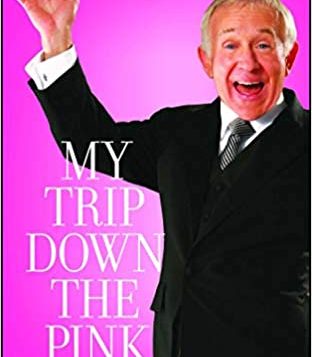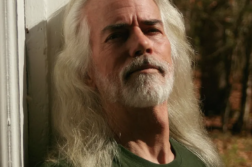THERE WAS a full house in the Renberg Theater at Los Angeles’s Gay and Lesbian Center. It was opening night of Leslie Jordan’s one-person show, My Trip Down the Pink Carpet, and his body microphone kept cutting out. After about five minutes, he said, “Y’all, I’m gonna stop for a minute. This mike is messed up. Was it me?” The flop sweat began; the lesbian technician came up on stage and practically undressed the star of the show. Then, like the pro that he is, Jordan picked up where he left off … and the mike still wasn’t fixed. So he unplugged and kept going. He was a huge hit and got a much deserved standing ovation.
Jordan’s one-person show and his new memoir of the same title tell the story of how he got to where he is. While not a leading man, he has been able to have a very successful career as an actor. One of the stories he tells in the show is about his rather unceremonious arrival in Hollywood: “I stepped off a Trailways bus at the corner of Vine and DeLongpre in 1982. I had $1200 sewn into my underpants—that was my mother’s idea.” From that inauspicious arrival in L.A. to winning an Emmy in 2006 for his portrayal of the inimitable Beverley Leslie on Will & Grace, Jordan’s tale is one of reslience, survival, and self-exploration.
 The wide-eyed Southerner who came to Hollywood in his mid-twenties has always seen the world through rose-colored glasses. When he showed up to chase his dreams, what he saw was the glitz and glamour of Tinseltown. As he tells it, “I was so excited to get out of Chattanooga, Tennessee, that when I hit my first gay bar in West Hollywood, I thought, ‘I’m home!’ I wasn’t going anywhere. I didn’t really have a home to go back to, so I had to stick it out, no matter what happened here. I’m glad of that—there were rough times.” Jordan found his element early on. “My first apartment was at Willoughby and Formosa, right behind the Formosa Café. At that television studio on the corner, they shot a lot of the Aaron Spelling shows, including Dynasty. About two weeks after I moved in, I was walking up to Santa Monica Boulevard, and I saw Joan Collins pulling out of the parking lot in a Bentley! I thought, ‘I am in Hollywood!’”
The wide-eyed Southerner who came to Hollywood in his mid-twenties has always seen the world through rose-colored glasses. When he showed up to chase his dreams, what he saw was the glitz and glamour of Tinseltown. As he tells it, “I was so excited to get out of Chattanooga, Tennessee, that when I hit my first gay bar in West Hollywood, I thought, ‘I’m home!’ I wasn’t going anywhere. I didn’t really have a home to go back to, so I had to stick it out, no matter what happened here. I’m glad of that—there were rough times.” Jordan found his element early on. “My first apartment was at Willoughby and Formosa, right behind the Formosa Café. At that television studio on the corner, they shot a lot of the Aaron Spelling shows, including Dynasty. About two weeks after I moved in, I was walking up to Santa Monica Boulevard, and I saw Joan Collins pulling out of the parking lot in a Bentley! I thought, ‘I am in Hollywood!’”
The mid-1980’s brought more than just TV commercials and guest spots. Jordan realized that he was happiest when he was, well, drunk. Or high. Or both. And he had a taste for rough boys, of which there were plenty within reach—with his paychecks he received for his infamous turn as the guardian angel in an early Selective Service commercial. The sibliant Jordan’s script: “Hey, Ralph! Guesss what today isss? The SSSelective SSService ssspecifically ssstatesss that you mussst regissster at the possst offissse within thirty daysss of your eighteenth birthday.” He tried to butch it up on the day of taping. The puzzled director said, “Cut! What happened to the flighty little angel I hired? Did John Wayne eat him?” Jordan learned an important lesson through experiences like this: he had to come to terms with himself—his sissy self—if he was going to succeed in Hollywood and in life.
In the midst of his wild nights and hung over days, Jordan’s friends started dying—some from overdoses, but most from a new disease. Early on in the AIDS crisis, Jordan became involved in AIDS Project Los Angeles (APLA) as a buddy and as a food delivery guy for Project Angel Food. Volunteering was a way of surviving the times. His supervisor would scold him about being so late with meal deliveries, but he just couldn’t drop off the food and go to the next address. His Southern mien and kindness compelled him to sit a spell and visit with the clients. With part of him feeling like a hopeless drunk, Jordan was humbled and enriched to give what he calls “loving service” to the sick and dying.
Jordan continued to work a lot during this turbulent time. His first one-person show, Hysterical Blindness and Other Southern Tragedies That Have Plagued My Life Thus Far, was a lesson in his need for sobriety. The show evolved into something of a success, but by then it was no longer really his show. Agents, producers, and others had taken over, and Jordan was in no condition to resist. Another lesson learned, and a major step on his journey to sobriety.
By the late 90’s, Jordan had hit bottom, Hollywood style. One night, having been arrested for drunk driving again, he was told by the guard, “Mr. Jordan, we have Robert Downey Jr. downstairs and have nowhere to put him, so he’s in and you’re out.” But the two men shared a few hours of quality time together before Jordan’s departure—the officers had to wait until after the bars had closed to release someone charged with DUI. That was the beginning of a decade of sobriety, which Jordan takes seriously and which has undoubtedly saved his life.
Now he’s taking his story on the road again. In Atlanta, his old stomping ground, someone came up to him after his last show, Like a Dog on Linoleum, and told him that he had a ministry. Taken aback, Jordan made a joke about Tammy Faye Bakker. But the woman persisted: “The story you told tonight of your journey into acceptance is so important. It makes so much more sense than anything I’ve ever been taught or led to believe about God.”
This is the kind of response so many people have to Leslie Jordan. He’s a survivor; he’s an Emmy winner; and he’s a hoot. His story is a classic Hollywood tale, from the Trailways station to Will & Grace and on to the Emmys as a presenter with Cloris Leachman. Now he’s sharing his experiences of facing his demons with large audiences. “At my first meeting, I told my AA group—all straight guys—that I fell out of the womb into my mother’s high heels. They laughed,” he reports. “I have no shame any more. No shame about being a sissy.” That’s the story of his trip down the pink carpet.
Jordan’s My Trip Down the Pink Carpet will open Off Broadway this spring. Don’t miss it!
Chris Freeman, co-author of Love, West Hollywood: Reflections of Los Angeles, teaches as the University of Southern California.







